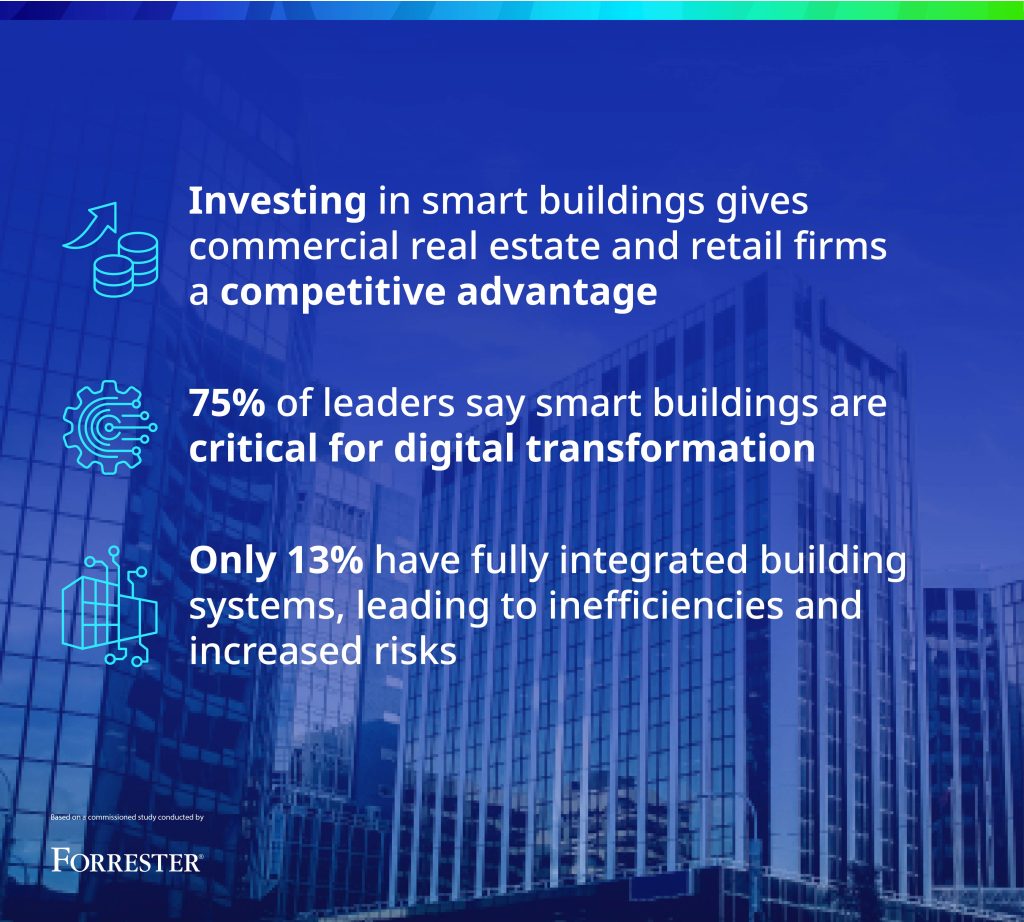- New report reveals investments in smart buildings are essential for leaders to enhance sustainability, security, and save money
- 75% of commercial real estate and retail leaders say smart buildings are important to accelerating digital transformation efforts
- Nearly two-thirds of respondents say smart buildings are important for reducing costs, accelerating sustainability initiatives, and driving business growth.

As the commercial real estate sector faces unprecedented challenges and against the backdrop of New York Climate Week 2024, the biggest annual climate event of its kind, the movement toward smarter buildings is top of mind. Building on a 2023 commissioned study conducted by Forrester Consulting on behalf of Johnson Controls (NYSE:JCI), a recently released spotlight report, “Cracking The Smart Buildings Code: A Spotlight On Retail And Commercial Real Estate,” reveals that investments in smart buildings are essential for leaders aiming to enhance sustainability, security, and save money.
“Smart buildings are not just a trend; there is growing recognition they are a necessity for modern commercial real estate,” said Vijay Sankaran, vice president and chief technology officer, Johnson Controls. “This report highlights the urgent need for integrated systems and expert partners to navigate the complexities of today’s commercial real estate market to achieve long-term success.”
The digitalisation of buildings provides an immense opportunity to gain a clearer picture of the operation of facilities to create sustainable, healthy, and safe environments—a critical differentiator for both commercial real estate tenants and buyers. Notably, 75% of commercial real estate and retail leaders say smart buildings are important to accelerating their digital transformation efforts. Nearly two-thirds of leaders indicate smart buildings are important for reducing costs, accelerating sustainability initiatives, and driving business growth. These results reveal that retail and commercial real estate leaders are seeking outcomes that have a positive impact for building owners, occupants and the bottom line.
Additional key findings include:
- Competitive Differentiator: Investing in smart buildings is a competitive differentiator. Smart buildings not only help commercial real estate and retail leaders attain sustainable, secure, and efficient outcomes, but they also competitively differentiate their facilities in the market.
- Integration Gaps: Only 13% of commercial real estate and retail leaders say they have fully integrated building systems, leading to inefficiencies and increased risks. This lack of integrated data and insight is reducing operating efficiencies (62%), reducing customer loyalty (59%), and increasing regulatory penalties (57%).
- Vital Insights: Building data is crucial for decision-making across various departments, including security, sustainability, and facilities management, and many leaders recognise the current risks they face by having limited data.
- Partner Expertise: Leaders seek partners with advanced technology, integration capabilities, and industry experience to drive smart building initiatives.
Johnson Controls is optimised to be the leading comprehensive solutions provider for commercial buildings, as a one-stop-shop for leaders looking for a partner with the technology and industry experience to drive meaningful outcomes. The company delivers a diverse portfolio of solutions for a variety of industries, from schools to office buildings, arenas to hospitals.
“As a leader in the smart buildings industry, we have a comprehensive understanding of how connected, data-driven solutions provide deeper insights into a building’s performance and how we can optimise equipment performance and enable proactive services,” said Julie Brandt, president of Building Solutions North America at Johnson Controls. “This report confirms what we’re already hearing from our customers, that smart buildings are foundational to the design, operation, and maintenance of indoor environments, ultimately driving value.”
At the centre of Johnson Controls’ smart building strategy is OpenBlue, an industry-leading ecosystem of connected technologies, expertise and services. Combining data from across a building’s systems and using advanced digital experiences augmented with AI, OpenBlue provides actionable insights and controls that save more energy and reduce more emissions than possible with isolated systems. It also helps customers in simplifying carbon disclosure reporting and regulatory compliance with building performance standards. With deployments across the globe spanning commercial office spaces, healthcare, education, campuses and more, OpenBlue enables real-time data visibility across assets, people and processes, empowering customers to drive intelligent and proactive operations from a single pane of glass.
To learn more about how Johnson Controls OpenBlue is transforming smart buildings, please visit: http://www.johnsoncontrols.com/OpenBlue.
For more insights, download the full report, “Cracking The Smart Buildings Code: A Spotlight On Retail And Commercial Real Estate,” available now here: https://www.johnsoncontrols.com/insights/2024/white-paper/cracking-the-code-cre.
Methodology
In August 2023, Johnson Controls commissioned Forrester Consulting to evaluate the state of smart buildings. Forrester conducted an online survey with 3,445 respondents responsible for smart building strategy to explore this topic. All respondents were asked high-level smart building strategy questions and then more granular questions depending on their level of responsibility for sustainability, security, and/or building environmental systems. Respondents represented organisations in 18 industries and 25 countries. The study was conducted in a double-blind fashion. This spotlight is focused on a subset of 299 smart buildings decision-makers in retail and commercial real estate.
Building, Design & Construction Magazine | The Choice of Industry Professionals





